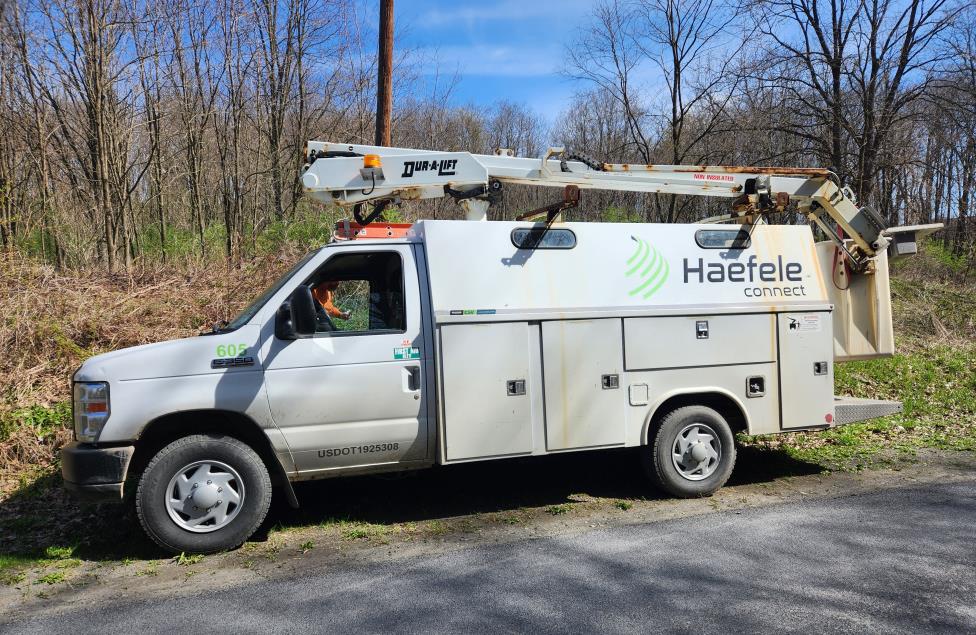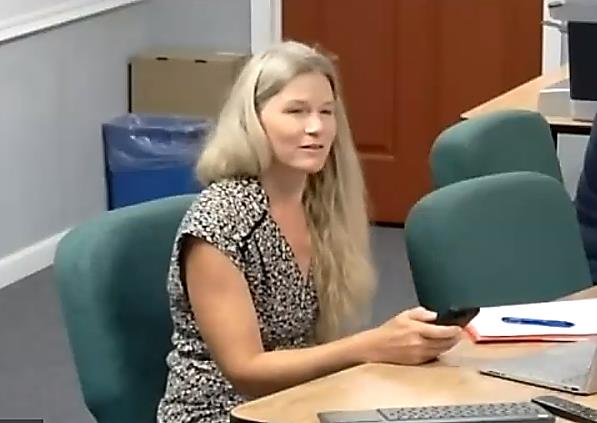Enfield taps Pittsburgh hired gun to haggle with Haefele
Reporting and Analysis by Robert Lynch, April 24, 2024
Enfield’s ten-year cable TV franchise with Haefele Connect has run out. Why someone forgetfully let it expire 18 months ago is a question all its own deserving an answer. But a more pressing inquiry at the moment is how we, Town Government, should negotiate a new Haefele agreement.

This Councilperson would prefer direct, across-the table, face-to-face discussions with owner Lee Haefele and his staff. That’s how it’s been done in the past. But that’s not how the Town Board’s majority wants it done now. Everyone but this writer demands that the Town of Enfield speak only through a high-powered, Pittsburgh-based law firm. The majority will prevail. The lawyers will move in. And one way or another, you, Enfield’s taxpayers, will pay the bill for them and suffer any consequences they inflict.
“Getting outside expertise is just wise,” Supervisor Stephanie Redmond argued before her Town Board April 10th. “When you’re not highly educated on the subject, you look for outside expertise. That is a matter of best interests of the Town,” she insisted.
By a vote of three-to-one, with this Councilperson, Robert Lynch, a determined and opinionated dissenter, the Enfield Town Board April 10th engaged the Cohen Law Group of Pittsburgh, and its principal, Dan Cohen, to negotiate the Haefele franchise renewal. The Cohen firm specializes in cable negotiations for municipalities. Dan Cohen served on the Pittsburgh City Council for a dozen years. He claims to have led efforts to regulate cable rates in that city, an initiative that led to FCC-demanded rebates for cable subscribers there.
Cohen Law purports to have helped more than 500 local governments over six states negotiate cable agreements. As approved by the Town Board this month, Cohen will charge Enfield a flat $8,900 fee.
“Franchise renewal is the best opportunity for the Town to obtain significant benefits and assert its legal rights with its cable operator,” Cohen Law stated in the second paragraph of its ten-page engagement proposal. The letter, itself is as long as the most recent franchise agreement between Enfield and Haefele. “Our objective will be to negotiate a new franchise agreement that addresses the changes since the last franchise and secures increased financial and legal benefits for the Town,” Cohen’s pitch to Enfield stated.

The company now known as Haefele Connect, based in Spencer, NY, began stringing TV cables through Enfield in 1984. Initially, it limited its service to homes along NY Routes 79 and 327, serving only Enfield’s residential backbone, with a few excursions up adjoining roads. The initial franchise reported a “basic service area” of 321 homes. Today, Haefele reaches the vast majority of Enfield residences.
Haefele’s initial 10-year contract with Enfield in 1984 carried a 5-year renewal option. Subsequent renewals occurred in 2001 and 2012. The Town Board’s 2012 meeting’s minutes reported that Enfield’s long-time municipal attorney, Guy Krogh, had first reviewed the final draft handed him by then-Supervisor Roy Barriere. Krogh had suggested minor changes and then handed the contract back. Quite likely, Barriere and Haefele had negotiated the agreement by themselves.
On October 10, 2012, Roy Barriere opened the required Public Hearing on the proposed ten-year Haefele contract. No one from the public spoke. Barriere closed the hearing three minutes thereafter. Later in the meeting, the Town Board, after limited discussion, ratified the contract unanimously.
But that was then; this is now. Stephanie Redmond, not Roy Barriere, now leads the Enfield Town Board.
“So after talking with Cohen Law, it appears that we have missed out a lot,” Redmond told the Town Board on this most recent April night. “And we could have been having income of over $50,000 a year, based on some of the things that he was mentioning.”
The money Redmond talked about is commonly referred to as a “franchise fee.” It’s a percentage of a cable operator’s gross receipts forwarded as revenue to the Town. The 1984 and 2001 Enfield agreements had each imposed a one per cent (1%) franchise fee on Haefele’s service. The 2012 agreement did not. Operators tack franchise fees onto subscribers’ bills.
“I’ve contacted all the other town supervisors around. They’re all getting franchise fees, and they’re all getting other kickbacks,” Redmond told our Board. “We are not getting anything like that, and to the tune of like $50,000 a year, which I know our pocketbooks could really, really enjoy.”
The Supervisor also claimed that with wise, skilled counsel, Enfield may be able to twist Lee Haefele’s arm to extend cable service to Enfield’s still-unserved areas, even though federal regulations customarily limit a municipality’s leverage over a cable operator to the television side of its business, not to the realm of broadband Internet.
“Three times in our Town’s history, we have negotiated contracts,” I informed the Board regarding the Haefele agreements, “and we have done it in a very non-confrontational and collegial way with a very good small business that provides better cable service for this Town than most other towns and the City of Ithaca enjoy.”
Among cable TV service providers in Tompkins County, Haefele in Enfield stands as the outlier. For Ithaca and most other places, Charter-Spectrum is the dominant hard-wired operator. It’s the largest multichannel video service provider in the nation. Spectrum’s higher rates, monopolistic conduct, and notorious poor customer service are demerits best not inflicted upon Enfield’s residents.
Spectrum is “way too much money for way too little, and it’s unreliable,” Dryden Town Supervisor Jason Leifer famously told a Tompkins County Council of Governments (TCCOG) meeting in August 2021. Leifer hasn’t changed his mind since. Dryden has launched its own municipal broadband service as a head-to-head competitor with Spectrum. At an earlier 2021 TCCOG meeting, shared results of an online customer survey gave Haefele Connect a 3.7 rating on a scale of zero to five; Spectrum-Ithaca a mere 2.3.
“We’ve got a good cable provider, and I don’t want to mess it up,” I told the Enfield Town Board during our 13-minute pointed go-around before we voted on Cohen Law’s engagement. “I don’t want to lawyer this up where we’ve got to have a hot-shot Pittsburgh attorney going down and talking with Lee Haefele. He’s going to have to get his attorney, and it’s going to get all lawyered up. And pretty soon, I fear, Lee Haefele will clap his hands and say, ‘That’s enough, Enfield; I’ll sell it to Spectrum,’ and then we’ll be stuck with Spectrum.”

“We are not negotiating this contract with Spectrum. We are negotiating it with Haefele,” Redmond apologetically responded, her counter-argument quite obviously missing my point. Redmond said the person she spoke to at Cohen Law showed no inclination to “stick it to Haefele.”
“I don’t see this as an acrimonious discussion,” Enfield’s Supervisor maintained. “I see this as we’re just updating their franchise agreement that’s sorely in need of updates.”
Just what kinds of revisions, outside of imposing a franchise fee, Redmond failed to specify that night.
“There was a lot with this that he was going through that—I mean, I don’t even know the language of it,” Redmond conceded following her Cohen conversation. “And I don’t even know the different types of, you know, bandwidths that are out there,” the Supervisor qualified. “That’s not my expertise.”
But in Redmond’s opinion, past home-grown franchise negotiations were much too hurried, too non-critical, and too deferential to the cable operator. The Town Board in 2012 “considered what seemed easy,” Redmond concluded. And when she most recently presented to Krogh and Cohen the now-expired contract (the one Krogh had signed-off on a dozen years ago), they were each quick to fault it.
“Both Guy and Cohen looked at it and went like, ‘Whooo, you guys have been going off of this for the last ten years, huh? It isn’t that good.’”
“Where are the complaints from the people in Enfield?” I offered the Supervisor in rebuttal. “I have not heard one person complain about cable TV service in this town. There are a few people who’ve been complaining about the fact that broadband doesn’t go everywhere. Guess what? Every town in Tompkins County has that problem.”
Later during the April 10th meeting, the Enfield Town Board endorsed a Resolution supporting an effort for Tompkins County to spend $100,000 toward launching a program aimed at filling in broadband Internet’s gaps county-wide, including in Enfield. The Tompkins County Legislature approved the expenditure April 16th and established a partnership with Point Broadband to serve the identified unserved areas. In Enfield, Point Broadband would likely contract with Haefele to string the cables and provide the service.

The lure of franchise fees stood most on the mind of the Town Board’s majority during the April meeting. Supervisor Redmond and this Councilperson carried most of the discussion. Councilperson Cassandra Hinkle participated minimally. Colleague Melissa Millspaugh, at home with a new baby and attending remotely that night, remained quiet. Yet both Hinkle and Millspaugh joined the Supervisor in supporting Dan Cohen’s retention. The remaining Board member, Jude Lemke, excused that night, had in a prior meeting expressed her support for specialized legal help in the franchise talks.
“We talk about all these franchise fees,” I reminded the Town Board that night. “Those franchise fees get tacked onto the cable bill. They are nothing more than an excise tax. You’re not drawing this money out of the cable company’s own resources. You’re taxing our residents, and a very regressive tax to boot,” I continued. “Because no matter how nice a house you have, how expensive it is, how much income you have, you’re still going to pay that same $3, $4, $5-a-month to the Town of Enfield as a tax.”
But dollar signs aside, the retention of Cohen law so much departs from past practice. I quoted to the Board from Page 3 of Cohen Law’s pitch to Enfield:
“CLG has developed a three-step approach to cable franchise renewal projects. The first is to identify the client’s specific needs…. Second, we negotiate firmly and deliberately with the cable operator in order to reach agreement in a timely fashion….” (The third step is cost-effectiveness for the client.)
“Firmly and deliberately; that means adversarial,” I stated to the Board as the irrefutable message.
“He’s going to talk to us first” Redmond replied softly. “And we can say, ‘Hey, we really like Haefele. Can you be very friendly with negotiations? We really like them, and we want them to stay.’ They can say all those things.”
“I just think it’s really important for us to have someone that has expertise in the field to give us all the information that we need that we don’t have, nobody on this Board has,” the Supervisor assessed.
“This is $8,900,” this Councilperson reminded everyone who cared to listen. “By voting for this, Resolution tonight, we’re committing the Town to spend $8,900 that I can’t spend in good conscience.”
****
Town Board majority votes carry a collective voice. Yet no individual Board member ever loses a voice of his own. After the 3:1 vote, this Councilperson informed the Board he would attempt his own meeting with Lee Haefele or his designee to revive the strategy that seemed to work so well in the past and discuss informally with the owner where cable talks should go.
“Destroy everything before it even starts,” Supervisor Redmond muttered, mostly under her breath. “This gets us off on a really nice foot. I hope you have a really wonderful discussion.”
The Town Board that night then went on to other business. We still have cable—and Haefele—for now. We also have a legal bill to pay.
###

